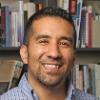Civil Discourse and Being Known
 Enoch Hill, Ph.D., Associate Professor of Economics
Enoch Hill, Ph.D., Associate Professor of Economics
Several years ago, I gave a talk related to the research on subjective well-being. One of the most consistent findings is the strong link between deep relationships and well-being. As you likely already know, it’s incredibly important to know and be known.
It makes sense then that college students deeply desire to belong. A reasonable strategy might be to avoid making offensive statements. Unfortunately, some combination of social media, technology, and political polarization has caused the number of potentially offensive topics to grow rather large. To preserve general acceptance, the domain of self-imposed censorship is inexorably expanding.
We’ve all experienced the results. Improper, or well-intentioned but misunderstood statements might go viral on social media. We read about protests or outrage at something others have said or done, or even about what some speakers might say if they were permitted on campus. We then fill in the unknown inner thoughts of our peers or classmates with the judgements we hear in the news. This mixture wells up and overflows in the form of a deafening silence. Many attempts at facilitating conversations on potentially controversial topics heat up all the way to lukewarm.
Perhaps in the effort to avoid offense something even greater is lost. When we avoid saying (or thinking) about topics that might give offense for long enough, it can become hard to remember what we actually believe in the first place. What happens to that part of us? Students are often asked in college entrance essays to write about themselves. One colleague remarked that a common student response is to ask, “who do you want me to be?” Somehow, we’ve crashed into the fundamental ontological question, “Who am I?”
As a verbal processor, I find that I often don’t know what I think until I’ve hashed it out with someone. Perhaps you experience things similarly? The current situation leads to a double bind. First, hungering for acceptance in my community, I’m less likely to feel comfortable expressing my thoughts out loud. Second, even if I overcome my own insecurities, it’s likely my peers also experience fear at risking offense. As a result, even my timid forays into sharing my more controversial thoughts may be met with silence. A combination of my own fears and a lack of willing conversation partners on topics that are relevant and important make it a challenge to figure out what I believe and at some deeper level, who I am. What am I actually passionate about? What do I stand for? Does it ever feel easier just to avoid having opinions?
Perhaps understanding the importance of civil discourse is a first step in motivating its cultivation. I launched this reflection with the idea that knowing and being known are critically linked to human flourishing. What is at stake in the silencing of civil discourse is not just missing out on some potentially stimulating conversations. If we lose ourselves in our efforts to never offend one another, is it possible we lose the very thing we were seeking to protect in the first place? How can I ever be known by another if I don’t even know myself? The communal skill of being able to engage productively, sincerely, and humbly in disagreement is worth learning, even if we risk offense in the process.
